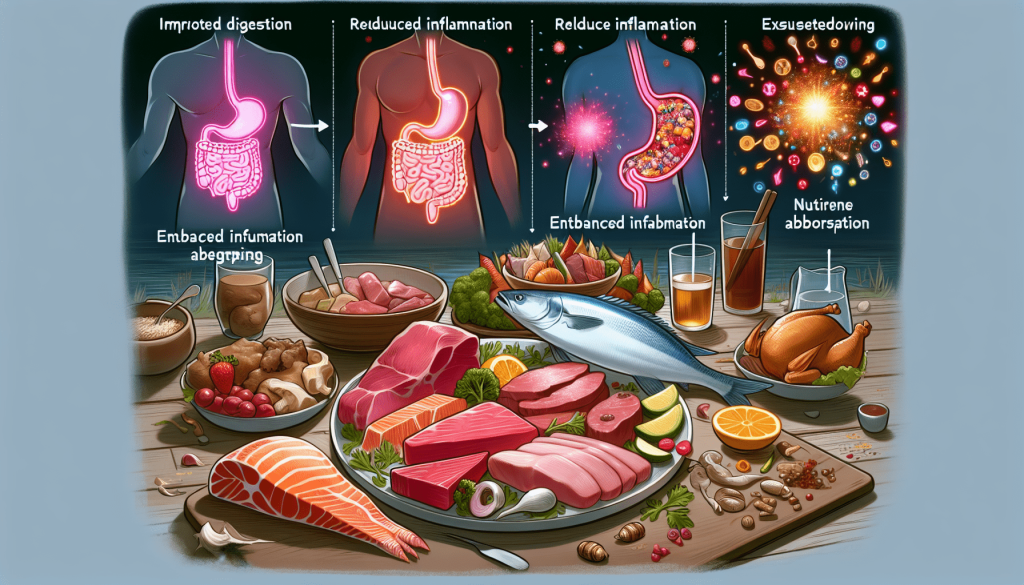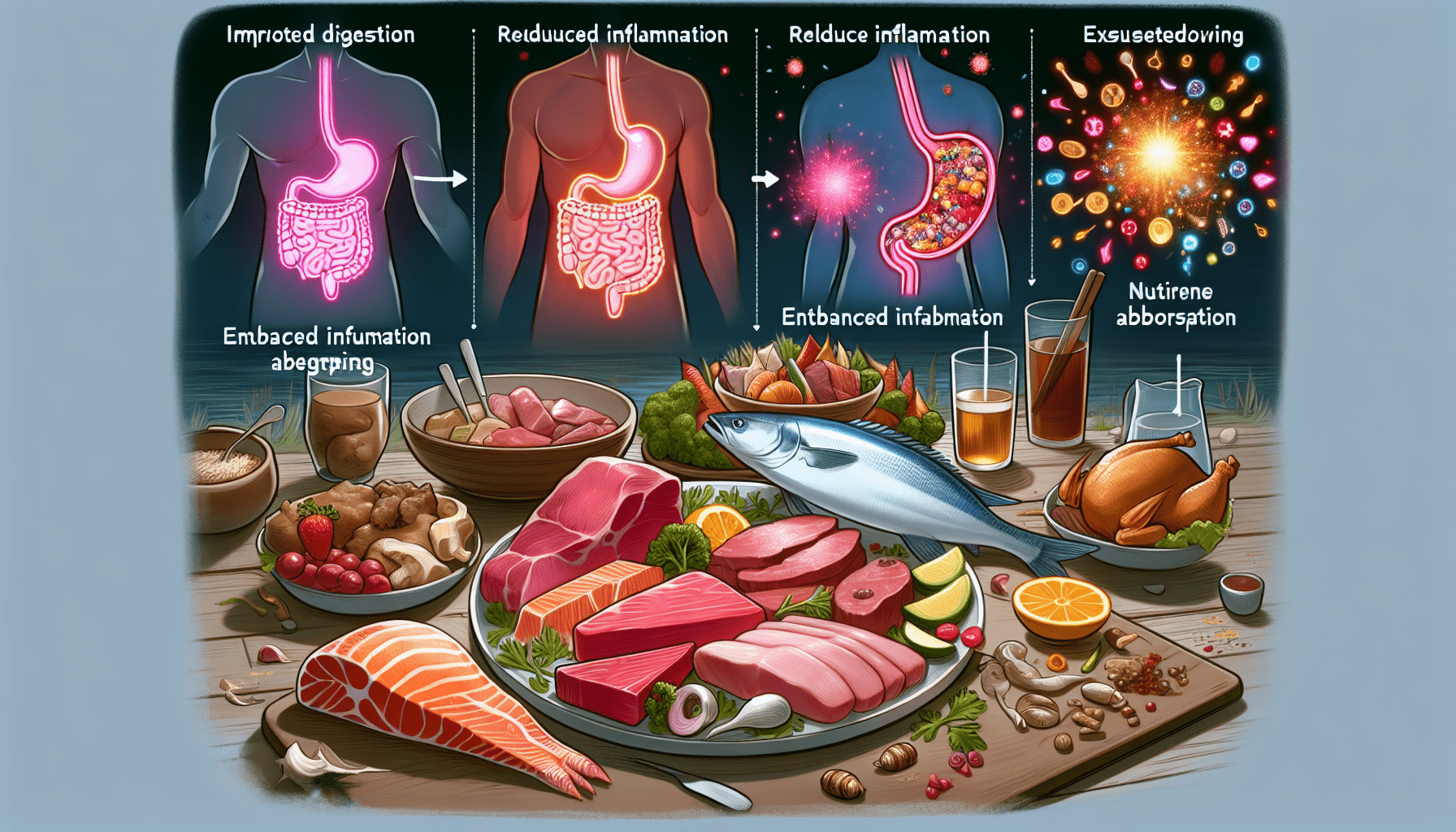If you’ve been struggling with digestive issues and are looking for a potential solution, you might be surprised to learn that adopting a carnivore diet could be the answer. By focusing on a diet primarily consisting of animal-based foods, you can potentially improve your digestive health and alleviate symptoms such as bloating, gas, and abdominal discomfort. This article explores the benefits of a carnivore diet in optimising digestive health, providing insights into how this approach can support your overall well-being. So, if you’re ready to explore a new way of eating that prioritizes your digestive health, keep reading.

Introduction to a Carnivore Diet
Explanation of a carnivore diet
A carnivore diet is a dietary approach that primarily focuses on consuming animal products while eliminating or significantly reducing the intake of plant-based foods. The core principle of this diet is to prioritize animal-based protein sources such as meat, fish, poultry, and eggs, while excluding or minimizing carbohydrates, fruits, vegetables, grains, and legumes. This way of eating emulates the diet followed by ancestral humans and aims to optimize digestive health by providing the body with nutrients and reducing potential irritants.
Benefits of a carnivore diet
The carnivore diet has gained attention for its potential benefits, particularly in terms of digestive health. By adopting this diet, many individuals report improvements in symptoms related to various digestive issues, such as bloating, gas, diarrhea, and irritable bowel syndrome (IBS). Furthermore, proponents of the carnivore diet claim that it promotes weight loss, enhances cognitive function, increases energy levels, and improves overall well-being. While further research is needed to fully understand the long-term effects of a carnivore diet, many individuals find it to be a sustainable and effective way to optimize their digestive health.
Understanding Digestive Health
Importance of digestive health
Digestive health plays a crucial role in our overall well-being. A healthy digestive system allows for the proper breakdown, absorption, and assimilation of nutrients from the foods we consume, while efficiently eliminating waste products. Good digestive health is essential for maintaining a strong immune system, supporting mental health, and preventing various chronic diseases. Therefore, taking care of our digestion is vital for optimal health and well-being.
Role of gut microbiota
The gut microbiota refers to the complex community of microorganisms that reside in our digestive tract. These microorganisms, including bacteria, viruses, fungi, and other microbes, play a pivotal role in maintaining our digestive health. They assist in the breakdown of dietary fibers, produce essential nutrients, modulate immune function, and protect against harmful pathogens. A diverse and balanced gut microbiota is crucial for efficient digestion and overall well-being.
Common digestive issues
Many individuals experience digestive issues at some point in their lives. From occasional discomfort to chronic conditions, digestive problems can significantly impact our quality of life. Common digestive issues include bloating, gas, indigestion, constipation, diarrhea, acid reflux, and irritable bowel syndrome (IBS). These issues can arise from various factors, such as poor diet, food intolerances, stress, infections, and imbalances in the gut microbiota.
Carnivore Diet and Digestive Health
How a carnivore diet affects digestion
The carnivore diet can have a profound impact on digestion. By eliminating plant-based foods, which can sometimes be difficult to digest for certain individuals, the digestive system is given a break from potential irritants. Animal-based protein sources are typically easier to digest and provide essential amino acids that support the body’s repair and maintenance processes. Additionally, the absence of carbohydrates can reduce digestive stress and promote more efficient nutrient absorption in the small intestine.
Changes in gut microbiota on a carnivore diet
When transitioning to a carnivore diet, the composition of the gut microbiota may undergo significant changes. As plant-based foods are eliminated, the population of bacteria that thrive on fiber and carbohydrates decreases. However, the carnivore diet still supports the growth of beneficial bacteria that can efficiently digest animal-based proteins and produce short-chain fatty acids, which provide energy for intestinal cells and support gut health.
Impact on digestive issues
Many individuals who adopt a carnivore diet report improvements in digestive issues such as bloating, gas, and diarrhea. By eliminating potential triggers such as foods that are known to cause food intolerances or irritate the digestive system, individuals may experience a reduction in symptoms. The increased availability of nutrients from animal sources and the reduction in carbohydrates can also support optimal digestive functioning and alleviate discomfort associated with certain digestive issues.
Improving Digestive Health with a Carnivore Diet
Elimination of potential trigger foods
One of the key ways a carnivore diet can help improve digestive health is by eliminating potential trigger foods. Plant-based foods, particularly those high in fiber and certain carbohydrates, can cause digestive distress in some individuals. By removing these potential irritants, the carnivore diet allows the digestive system to heal and reduces the likelihood of experiencing symptoms such as bloating, gas, or diarrhea.
Reduced inflammation in the gut
Inflammation in the gut is a common underlying factor in many digestive issues. The carnivore diet, with its focus on high-quality animal protein and low anti-nutrients, helps reduce inflammation in the gut. Animal protein provides essential amino acids, which play a crucial role in repairing and maintaining the gut lining. Furthermore, the absence of inflammatory compounds found in some plant foods can help alleviate gut inflammation, leading to improved digestive health.
Balancing gut microbiota
The carnivore diet can also positively impact the balance of gut microbiota. While the diet eliminates certain fiber-dependent bacteria, it supports the growth of beneficial bacteria that thrive on animal-based proteins and fats. This helps promote a diverse and healthy microbiome, which is crucial for optimal digestion and overall well-being. A balanced gut microbiota can contribute to improved nutrient absorption, reduced inflammation, and enhanced immune function.
Repairing the gut lining
The carnivore diet provides optimal nutrition for the cells lining the gut. The amino acids found in animal protein are essential for the repair and regeneration of gut epithelial cells. Consuming high-quality animal products, which are rich sources of nutrients like collagen, can support the healing and strengthening of the gut lining. This can help improve digestion, reduce permeability (leaky gut), and promote overall digestive health.

Elimination of Potential Trigger Foods
The role of plant foods in digestive issues
Plant-based foods, while generally healthy and nutritious, can sometimes contribute to digestive issues in susceptible individuals. Certain types of fiber, such as those found in grains, beans, legumes, and some vegetables, can be difficult to digest for some people, leading to bloating, gas, and discomfort. Additionally, certain carbohydrates, such as those found in onions, garlic, and cruciferous vegetables, can ferment in the gut and cause digestive distress. By eliminating these potential trigger foods, the carnivore diet can provide relief for those with sensitive digestive systems.
Removal of common allergens and irritants
The carnivore diet eliminates many common allergens and irritants that can contribute to digestive issues. Foods such as gluten-containing grains, dairy products, and soy are known to cause allergies or intolerances in certain individuals. By removing these foods, individuals can identify if they have any sensitivities or allergies that may be affecting their digestive health. This elimination phase allows for a “reset” of the digestive system, enabling individuals to reintroduce certain foods gradually and assess their impact on their digestive well-being.
Reduced Inflammation in the Gut
High-quality animal protein and low anti-nutrients
The carnivore diet focuses on consuming high-quality animal protein, which provides essential amino acids and promotes the repair and growth of tissues, including the gut lining. Animal protein is highly bioavailable and does not contain anti-nutrients commonly found in some plant-based foods, such as lectins or phytates, which can contribute to gut inflammation. By reducing these potential sources of inflammation, the carnivore diet supports a healthier and less irritated gut.
Effects of reduced inflammation on gut health
Reducing inflammation in the gut has numerous benefits for digestive health. Inflammation can impair the function of intestinal cells, compromise the integrity of the gut lining, and contribute to leaky gut syndrome. By adopting a carnivore diet, which minimizes pro-inflammatory compounds and provides optimal nutrition for gut repair, individuals may experience reduced inflammation in their gut. This can lead to improved absorption of nutrients, enhanced gut barrier function, and a decrease in digestive symptoms.
Balancing Gut Microbiota
Effects of a carnivore diet on gut microbiota
The transition to a carnivore diet can cause significant changes in gut microbiota composition. While some fiber-dependent bacteria may decrease in numbers, beneficial bacteria that thrive on animal-based proteins and fats can flourish. This shift can promote a more diverse and balanced microbiome, which has been associated with improved digestion, enhanced immune function, and a reduced risk of certain diseases. The carnivore diet supports a gut environment that is conducive to the growth of beneficial microbes, which in turn contribute to better digestive health.
Promoting a diverse and healthy microbiome
A diverse and healthy gut microbiome is key to optimal digestive health. The carnivore diet, with its emphasis on high-quality animal proteins and fats, can provide the necessary nutrients for beneficial bacteria to thrive. These bacteria play a crucial role in breaking down and fermenting the animal-based components of the diet, leading to the production of short-chain fatty acids that support gut health. Additionally, a diverse gut microbiome can contribute to improved digestion, nutrient absorption, and overall well-being.
Repairing the Gut Lining
Optimal nutrition for gut epithelial cells
The cells lining the gut, known as gut epithelial cells, play a vital role in maintaining digestive health. The carnivore diet provides optimal nutrition for these cells, particularly through its focus on high-quality animal protein. Animal protein is a rich source of amino acids, which are essential building blocks for tissue repair and regeneration. By supplying the gut epithelial cells with the necessary nutrients, the carnivore diet supports the healing and strengthening of the gut lining, aiding in proper digestion and promoting overall gut health.
Providing essential nutrients for gut repair
In addition to amino acids, the carnivore diet provides various essential nutrients that support gut repair. Animal-based foods, such as bone broth and collagen-rich meats, contain components like gelatin and collagen that are beneficial for gut health. These substances help to repair the gut lining, enhance its integrity, and reduce permeability. By consuming these nutrient-dense foods, individuals on a carnivore diet can actively support the repair and maintenance of their gut, ultimately leading to improved digestive health.
Potential Challenges of a Carnivore Diet for Digestive Health
Lack of dietary fiber
One potential challenge of the carnivore diet is the limited intake of dietary fiber. While fiber is often associated with plant-based foods, it can also be found in certain animal products such as organ meats, connective tissues, and bone broth. However, the overall fiber content in a carnivore diet is significantly lower compared to diets that include a variety of plant foods. While some individuals adapt well to this reduced fiber intake, others may experience changes in bowel movements or temporary digestive discomfort. However, it is important to note that the human body can adapt to different dietary fiber levels, and the carnivore diet provides other benefits that may offset the need for high fiber intake.
Potential vitamin and mineral deficiencies
Another potential challenge of the carnivore diet is the risk of nutrient deficiencies, particularly in regards to certain vitamins and minerals typically obtained from plant-based foods. It is crucial for individuals following a carnivore diet to ensure they are obtaining adequate nutrition from animal sources. This may involve including a diverse range of animal products, such as organ meats, bone broth, and seafood, to ensure a comprehensive nutrient profile. Additionally, consulting a healthcare professional or registered dietitian can help individuals identify any potential nutrient gaps and develop strategies to mitigate deficiencies, such as targeted supplementation if necessary.
Seeking Professional Advice
Importance of consulting a healthcare professional
Before embarking on any dietary changes, it is essential to consult with a healthcare professional, especially if you have pre-existing digestive issues or underlying health conditions. They can provide personalized guidance based on your specific needs, medical history, and individual circumstances. A healthcare professional can assess your suitability for a carnivore diet, monitor your progress, and ensure that your dietary choices align with your overall health goals. They can also provide guidance on optimizing digestive health, managing potential challenges, and addressing any concerns you may have.
Individualized approaches to digestive health
Every individual’s digestive system is unique, and what works for one person may not work for another. It is crucial to adopt an individualized approach to digestive health and understand that different dietary strategies may be necessary for optimal well-being. While some people may find significant benefits from a carnivore diet, others may require a more balanced approach that includes a variety of nutrient-dense foods from both plant and animal sources. By working with a healthcare professional, you can navigate the intricacies of your digestive health and explore the best dietary options tailored to your specific needs.
In conclusion, the carnivore diet has gained popularity for its potential benefits in improving digestive health. By eliminating potential trigger foods, reducing inflammation, balancing gut microbiota, and supporting the repair of the gut lining, the carnivore diet offers a unique approach to optimizing digestion. However, it is important to consider potential challenges such as reduced dietary fiber and the risk of nutrient deficiencies. Seeking professional advice and adopting an individualized approach are paramount to ensuring that the carnivore diet is suitable for your digestive health and overall well-being. With proper guidance and careful consideration, the carnivore diet can be a valuable tool for those wanting to improve their digestive health.
